Rape Cases
Rape cases are among the most difficult to defend in front of a jury, and they are among the most difficult to reach a reasonable settlement. In a rape trial, constitutional rights are essentially thrown out the window. An example is that any prior rape allegation or accusation of sexual misconduct will very likely come into evidence even if the client does not testify.
The consequences are dire. A rape conviction does not only almost assuredly result in a prison sentence but also results in lifetime registration as a sex offender, which in turn restricts where a person can live and go for the rest of his life. If an allegation that the rape occurred during a burglary or a weapon was used is proven, it will result in a mandatory life sentence.
An experienced attorney is imperative in a case like this. The best outcome is to negotiate a resolution that does not include prison and sex registration. The best chance for that type of resolution is with an attorney that is ready willing and able to take the case to trial, and has had success in jury trials in rape cases. The only way to get a positive negotiated resolution is if the district attorney knows that rejecting a reasonable offer will result in a jury trial against an attorney that has won rape jury trials. Addison has 26 jury trial acquitted rape counts.
Addison has done rape trials and won trials.
Every client discussed here has given permission to have their case recognized here. Jury trials are public events, so permission actually isn't needed. However, the stigma of being accused of rape is something that never goes away, even if there's an acquittal. It's for that reason that client's want the stories of their acquittals to be available to the world. Even though there is permission and the cases are public, first names and case numbers are used, that way the clients can send people to the webpage to read about how they were acquitted.
If you need to hire a lawyer for a rape case, you need a lawyer that has experience with rape cases, and that has won a rape case before a jury. The only way to have successful negotiations to resolve a rape case is if the district attorney knows that the attorney can and will take the case to jury trial and have a significant chance of winning that jury trial. Addison has not only done ten rape, child rape, attempted rape, or rape related charges trials, he has had a full acquittal in two rape trials, one where there was an allegation that the rape occurred during a burglary and that a weapon was used, which means that Addison saved the client from a life in prison sentence, there was a DNA match to his client, and yet with hard work he won the case (Dennis C., RIF132797), the other where the client's roommate accused him of raping her (Marino L.P., 1501535). He's also had two child rape cases where the clients were acquitted of all felony counts and all sex crime related counts (Antolin I., 1461688 and Jorge D.C., 1411049). Addison has 26 acquitted rape, or rape related counts in jury trials (Dennis C., RIF126995 acquitted of forced oral copulation and the lesser offense of assault for rape and acquitted of rape, the special allegations of rape during a residential burglary and rape with a knife were not reached because of the acquittals on the charged crimes; Mariano L.P., 1501535 acquitted of rape, the lesser included offenses of attempted rape and assault for rape and acquitted of sodomy by force and the lesser included offenses of attempted sodomy by force and assault for rape; Antolin I., 1461668 acquitted of attempted rape of a child--not to mention also being acquitted of ten child molestation counts; Jorge D.C., 1411049 acquitted of three counts of child rape, three counts of the lesser included offense of attempted child rape and acquitted of three counts of penetration with a foreign object and three counts of the lesser included offense of attempted penetration with a foreign object; Ronald L., 17CR01821 acquitted of kidnapping for rape--and all the lesser included offenses, acquitted of rape and the lesser included offense of attempted rape and acquitted of penetration with a foreign object and the lesser included offense of attempted penetration with a foreign object; and Carl C., RIF132797 acquitted of kidnapping for rape through a successful Penal Code section 1118.1 motion during trial). He also has one hung jury count on a forced oral copulation charge, Kahlil B., 18CR03793. If you find an attorney with more (verifiable, not just talking about it) experience doing jury trials in rape cases, that has had more successful outcomes in rape jury trials, and that has saved more clients from prison and lifetime registration because of successful jury trials, hire that person.
Addison's rape trial successes and experience:
Dennis C., RIF126995
- Charges: Rape (Penal Code § 261(a)(2)) with special allegations of rape during a residential burglary (Penal Code § 667.61(d)(4)) and rape with use of a weapon (12022.3(a), and oral copulation by force (Penal Code § 288a(c)(2)) with lesser offenses, assault with intent to commit oral copulation by force (Penal Code § 220), battery (Penal Code § 242) and assault (Penal Code § 240) with special allegations of oral copulation by force during a residential burglary (Penal Code § 667.61(d)(4)) and oral copulation by force with use of a weapon (12022.3(a).
- Exposure: Dennis was facing 80 years to life in prison.
- Outcome: Despite a DNA match and saying on the witness stand that he had raped Jane Doe, Dennis was acquitted of all charges and all lesser included offenses.
This was a challenging trial because Dennis was serving a prison sentence for kidnapping, that district attorney argued was in fact a kidnapping for rape, and there was a cold case DNA hit that matched Dennis. The alleged victim reported that a stranger had broken into her apartment and raped her at knife point. Dennis testified that he in fact knew her because he was living a few apartments away. They had flirted and talked, they had talked about how her husband was always at work and she was lonely. She eventually invited him and they had sex. However, during the sex she changed her mind. Dennis testified that he continued to have sex with her after she told him to stop because he didn't think that she was telling him to stop having sex, but was telling him to stop that position. On cross examination the district attorney asked him if he raped her because he continued after she told him to stop. He answered, "Yes." Addison explained to the jury that even if Dennis, in hindsight, thought it was rape, that the legal standard in that situation was whether Dennis, at that time and in that situation, thought the statement meant to stop having sex. It didn't matter if after the fact, thinking about it in hindsight, that Dennis thought she meant that she wanted him to stop having sex. They believed that Dennis, at that time, did not believe that alleged victim was actually telling him to stop having sex. The jury completely disregarded the alleged victims testimony and agreed with Addison's closing argument that her testimony just didn't make sense.


The newspaper article covering Dennis and Addison's trial victory.
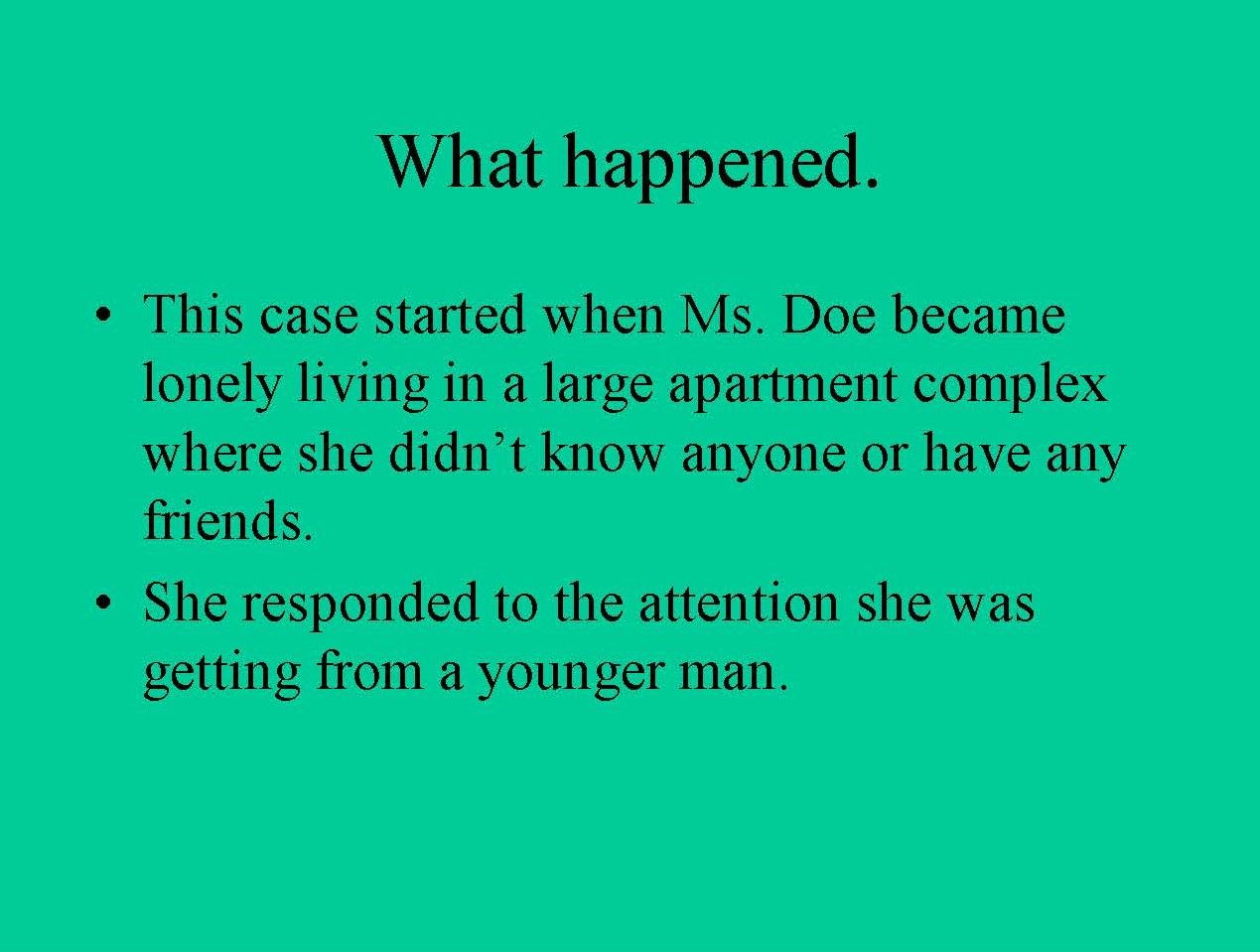
This is one of the slides from Addison's closing argument. The jury saw the truth to acquit Dennis on all charges.
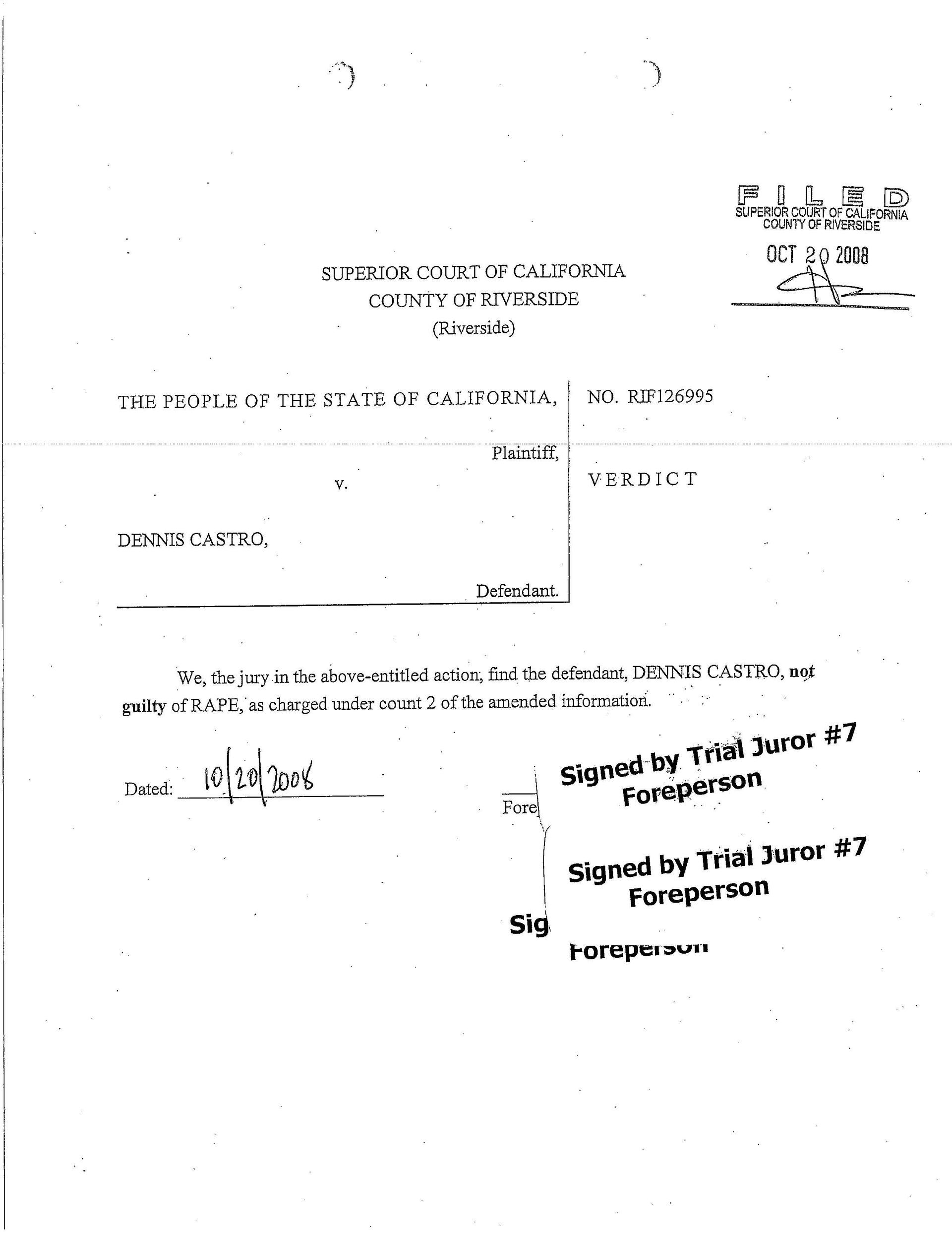
This is the verdict form from the rape charge.
There were actually many not guilty verdict forms because Dennis was acquitted of all charges and all lesser included offenses.
Mariano L.P., 1501535
- Charges: Rape (Penal Code § 261(a)(2)) and forced oral copulation (Penal Code § 286(c)(2)(A)).
- Exposure: Mariano was facing 16 years in prison.
- Outcome: Mariano was found not guilty of all charges and not guilty of all lesser included offenses.
Mariano's trial was challenging because like many rape cases there was no issue regarding him having had sex with the alleged victim, making the case about whether or not the sex was consensual. Mariano testified that his roommates were a family and that he and the alleged victim had a longstanding affair going right under the alleged victim's husband's nose. He testified that the affair was going well until he found a girlfriend and decided to move out to live with his new girlfriend. When he was moving his things out that alleged victim's apartment, she became enraged and told Mariano that she was going to make him pay for leaving her. She then accused him of raping her and during the trial she added a second allegation of him raping her. The jury believed Mariano and did not believe the alleged victim at all. They acquitted him of all charges and all lesser included offenses. Mariano went home and has moved on with his life.
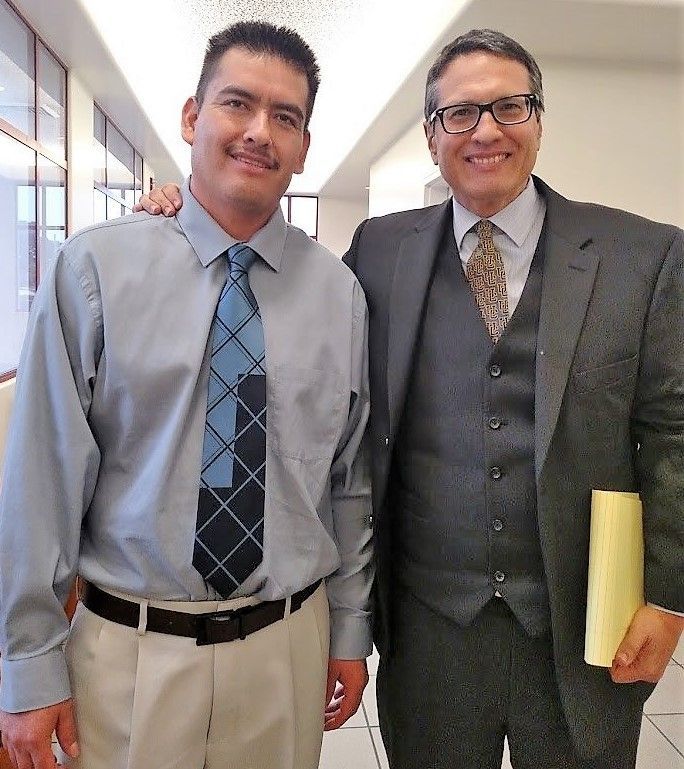
This is Mariano and Addison after the verdict. Mariano was released immediately because the judge agreed with Addison that he did not have jurisdiction to send him back to the jail to process out. Mariano and Addison assured the judge that they would complete the paperwork to process out and they did just that. Mariano is now home and has moved on with his life.
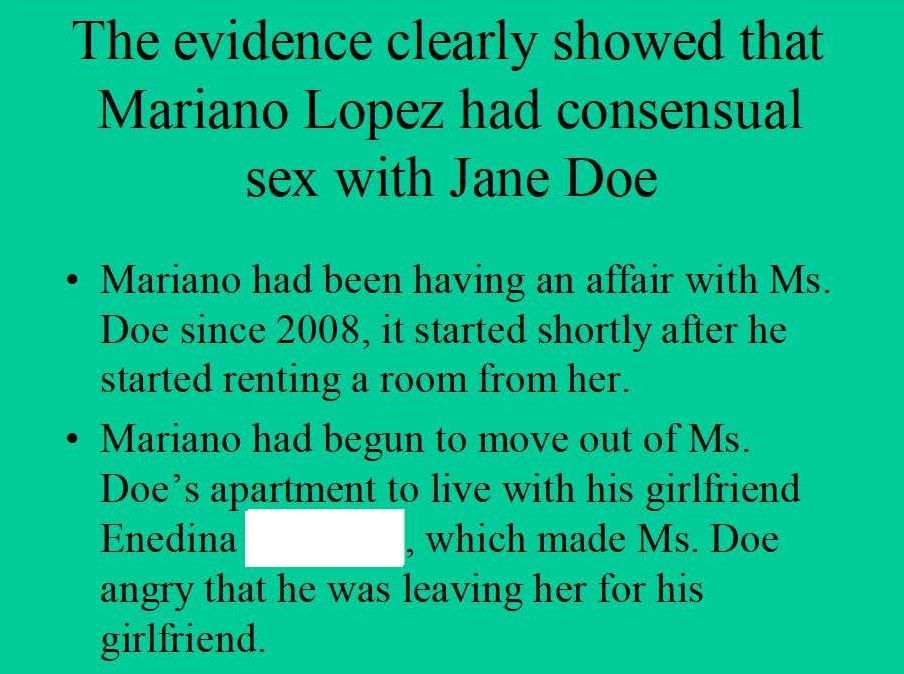
This is one of the slides that Addison used in his closing argument in Mariano's trial.
The jury saw the truth of what happened and acquitted Mariano of all charges.
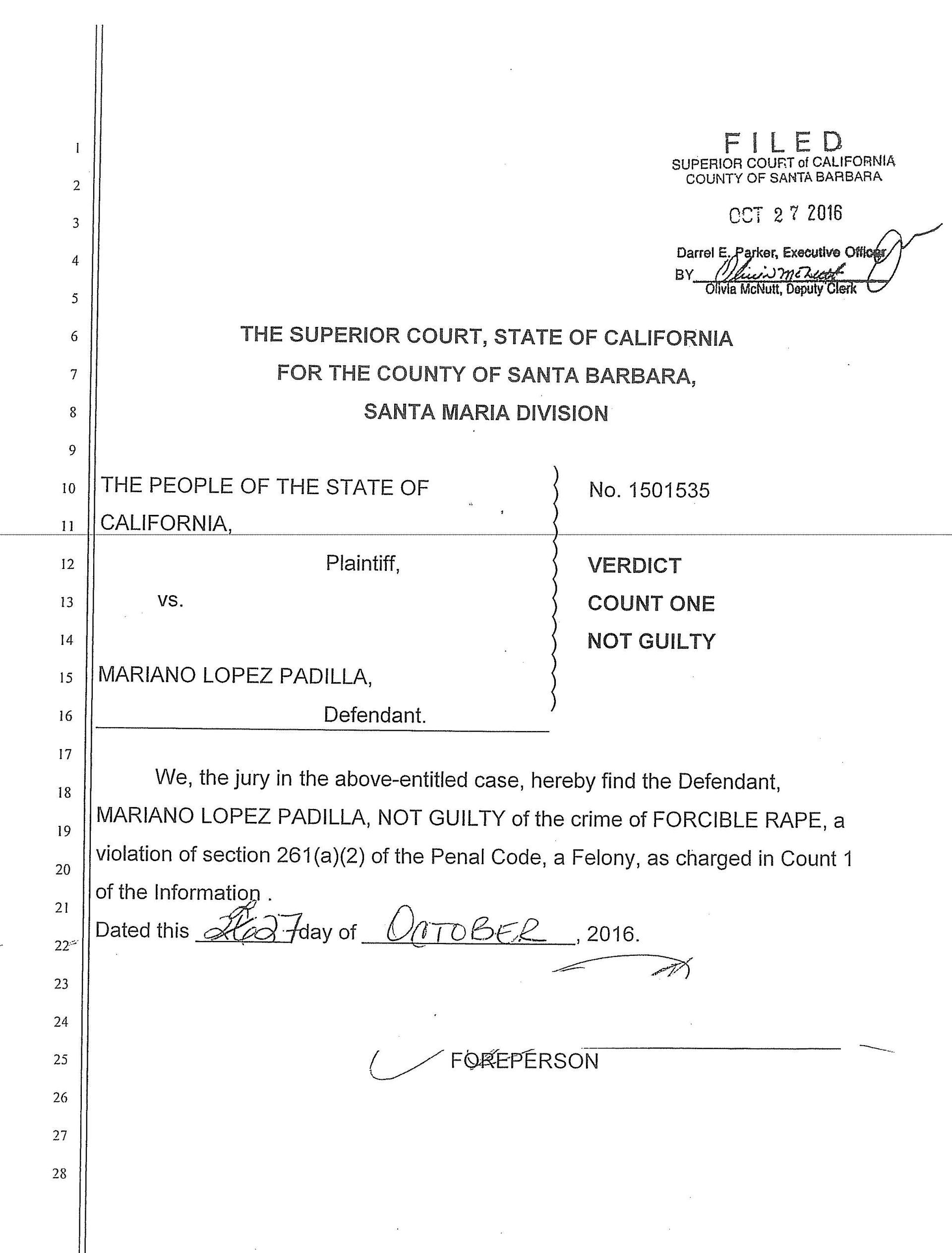
This is the Not Guilty verdict form for the rape charge.
There were many more Not Guilty verdict forms because Mariano was acquitted of all charges and all lesser included offenses.
Antolin I., 1461668
Charges: Four counts of child molestation by means of force or fear (Penal Code § 288(b)(1)) with lesser offenses of three counts of attempted child molestation by means of force or fear (Penal Code § 664/288(b)(1)), lesser offenses of three counts of battery (Penal Code § 242) and lesser offenses of three counts of assault (Penal Code § 240), one count of attempted rape (Penal Code § 664/261(a)(2)) with a lesser of offense of battery (Penal Code § 242) and a lesser offense of assault (Penal Code § 240), one count of molesting a child that was fourteen or fifteen years old (Penal Code § 288(c)(1)) with a lesser offense of attempted molestation of a child fourteen or fifteen years old (Penal Code § 664/288(c)(1), with a lesser offense of battery (Penal Code § 242) and a lesser offense of assault (Penal Code § 240).
Exposure: Antolin was facing 48 years four months in prison.
Outcome: Despite a “confession,” Antolin was acquitted by the jury of all the felony counts and all the child molestation counts. He was only convicted of a misdemeanor assault for pushing one of the accusers into a bush.
This case was challenging because of the videotaped “confession.” The interrogation was held in English despite English being his second language and having very limited communication skills in English. Antolin had two nieces that accused of molesting them. The evidence that we presented at trial was that Antolin was in the process of becoming a U.S. citizen and his nieces knew that. They had a really trivial argument that resulted in Antolin pushing one of the nieces into a bush. They then declared that they were going to call Immigration and make something up that would keep him from becoming a citizen. This was yet another case where the interrogator used the Reid Technique to elicit a false confession. The psychological interrogation technique is very effect at drawing out false confessions, especially from juveniles, second language speakers being interrogated in their non-native language, uneducated or unsophisticated people. It was developed by John Reid in 1955 when he extracted a confession from Darrel Parker for the murder of his wife. Parker was convicted because of the "confession" and sentenced to life in prison. Reid then capitalized on the technique setting up a company and making a living teaching it to law enforcement throughout North America. It was later determined that Parker was innocent after another man confessed to the killing. Parker sued for wrongful conviction and was awarded a half million dollars (in 1950s money). After Addison explained to the jury how the Reid Technique is very effective at garnering false confessions, the jury disregarded the "confession." The jury acquitted Antolin of all charges except the misdemeanor assault of pushing his niece into a bush which he admitted.
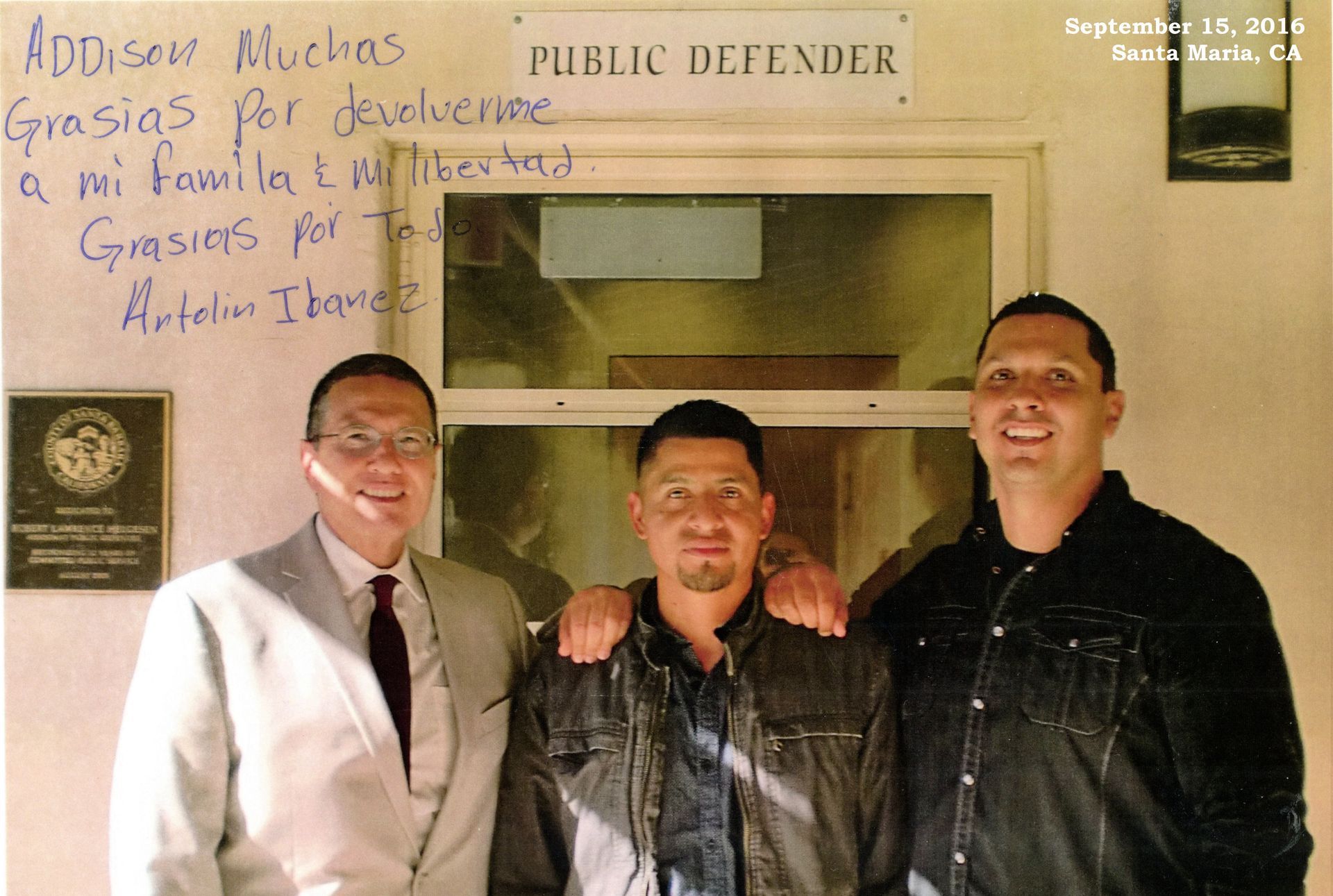
This is Antolin, Addison and the investigator on the case.
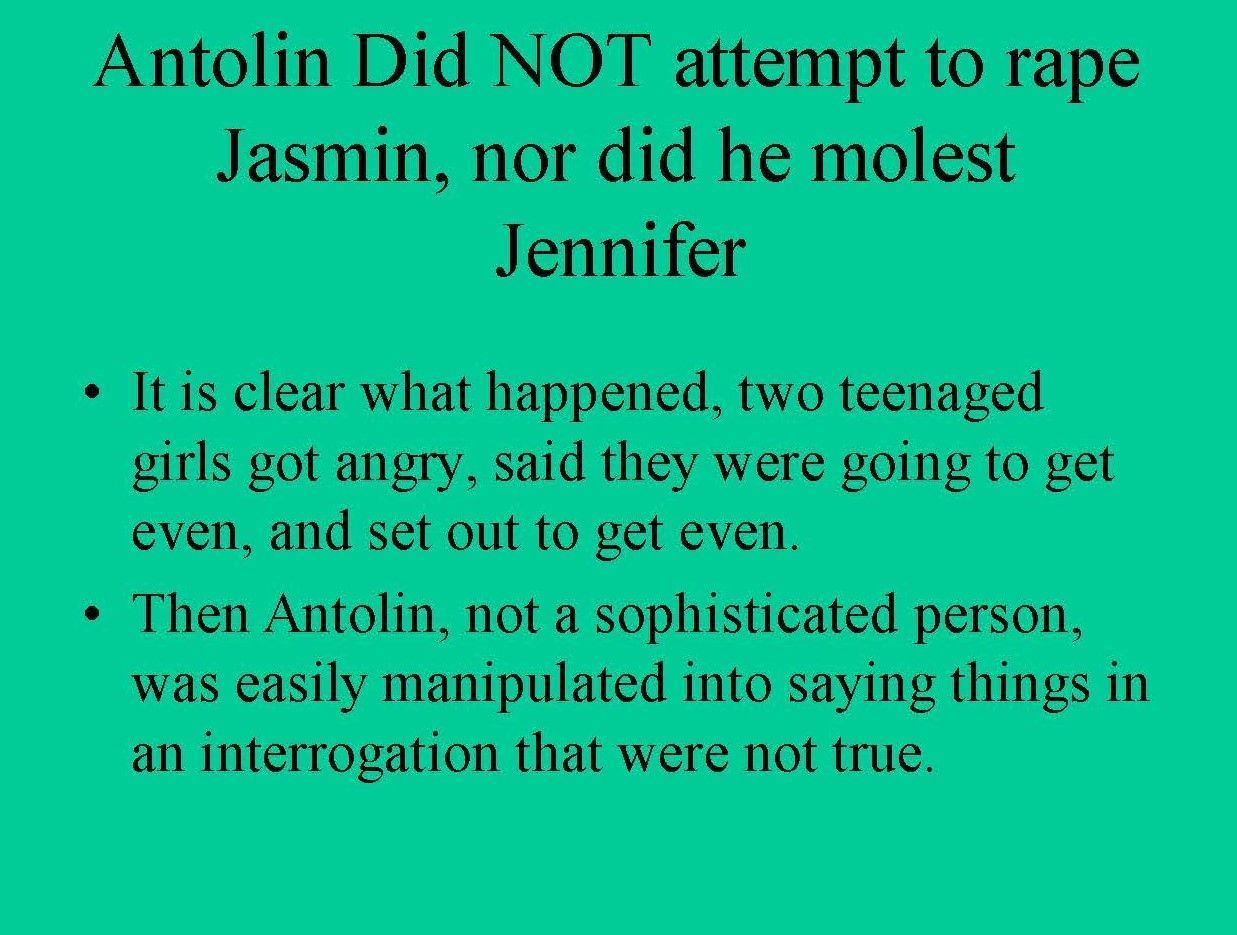
This is the opening slide from Addison's closing argument.
The jury saw through the false allegations and understood that the "confession" was the result of coercion.
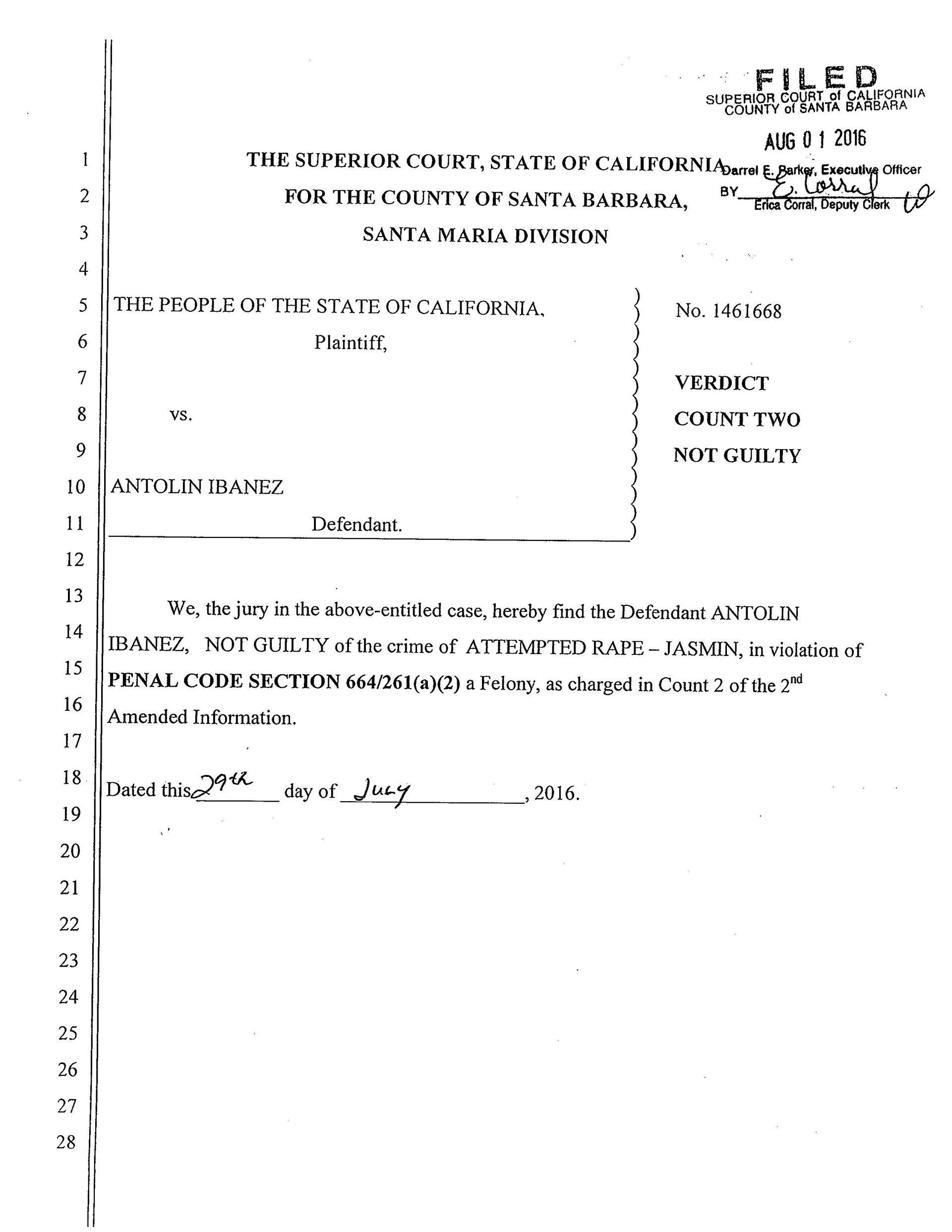
This is the Not Guilty verdict form when Antolin was acquitted of attempted rape.
He was acquitted of all the felony counts and all the sex crime counts.
Jorge D.C., 1411049
- Charges: Three counts of sexual acts with a child ten years old or younger, child rape (Penal Code § 288.7(a)) with lesser offenses of three counts of attempted sexual acts with a child ten years old or younger (Penal Code § 664/288.7(a)), lesser offenses of three counts of penetration of a person under fourteen (Penal Code § 289(j)), lesser offenses of three counts of attempted penetration of a person under fourteen (Penal Code § 664/289(j)) and lesser offenses of three counts of simple battery (Penal Code § 242).
- Exposure: Jorge was facing 45 years to life in prison.
- Outcome: Despite a videotaped confession, Jorge was acquitted of all the child molestation-related counts by the jury. He was only convicted of two misdemeanor lesser offenses of simple battery (the other count of misdemeanor simple battery was dismissed by the district attorney when the jury was hung on that count). The two convicted counts did NOT carry sex offender registration. He was given credit for time served on the two misdemeanor counts.
This was a challenging trial because the investigating detective had coerced a false "confession." Jorge had asked for an interpreter for the interrogation, but that request was ignored by the investigating detective and the interrogation was conducted in English, Jorge's second language. This was another Reid Technique interrogation. The jury found the way the interrogation was conducted to be particularly offensive. The alleged victim testified that an uncle had molested her and that it wasn't Jorge, despite that the district attorney pressed forward with full confidence that he would secure convictions and a life in prison sentence because the alleged victim had initially said that Jorge molested her. The jury acquitted Jorge of all the charges except two counts of simple battery because Jorge told the jury that there were two times when he was bathing the child that he became frustrated with her not cooperating with taking a bath and that he set her in the bathtub a bit roughly. Those charges were NOT in any way molestation related.
This is the Verdict Form for the lead charge.
Jorge was acquitted of all the molestation-related charges.
He was only convicted of two counts of simple battery, given credit for time served, and released from jail.

This is the opening slide that Addison used in his closing argument.
The jury saw the truth and questioned if Casey would ever be prosecuted.
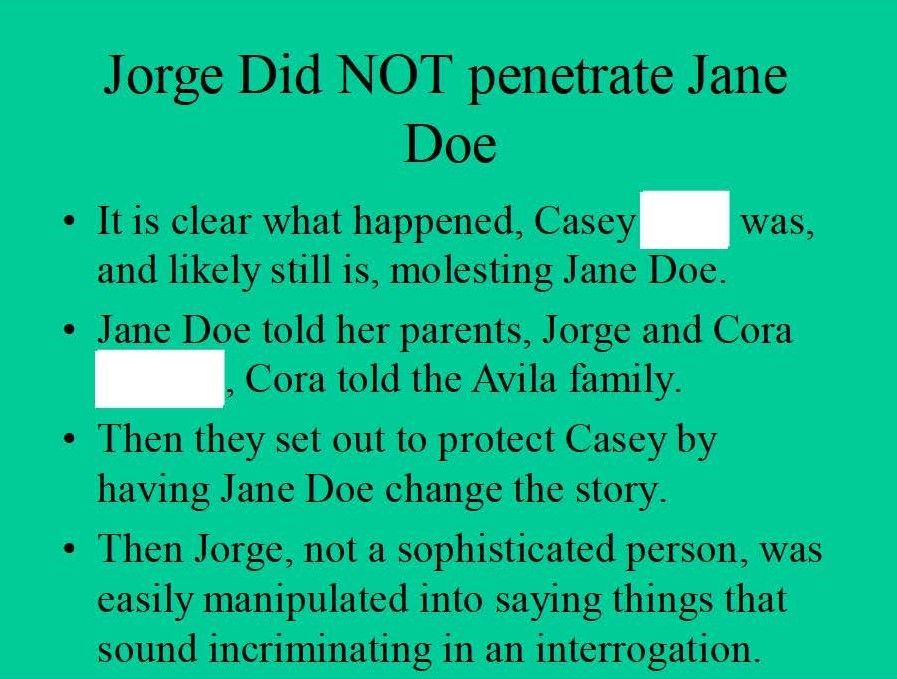
Ronald L., 17CR01821
- Charges: Kidnapping for rape (Penal Code § 209(b)(1)) with lesser included offenses of kidnapping (Penal Code § 207(a)), felony false imprisonment (Penal Code § 236), misdemeanor false imprisonment (Penal Code § 236), battery (Penal Code § 242) and assault (Penal Code § 240), rape of an unconscious person (Penal Code § 261(a)(4)(A)) with a lesser included offenses of attempted rape of an unconscious person (Penal Code § 664/261(a)(4)(A)) and battery (Penal Code § 242), penetration with a foreign object of an unconscious person (Penal Code § 289(d)) with a lesser included offenses of attempted penetration with a foreign object of an unconscious person (Penal Code § 664/289(d)) and battery (Penal Code § 242), rape of an intoxicated person and penetration with a foreign object of an intoxicated person.
- Exposure: Ronnie was facing 162 years to life in prison.
- Outcome: The jury acquitted Ronnie of kidnapping for rape, which carries a life sentence, and all the lesser included offenses. He was acquitted of rape of an unconscious person and the lesser included offense of attempted rape of an unconscious person, he was convicted of the lesser included offense of misdemeanor simple battery. He was acquitted of penetration with a foreign object of an unconscious person and the lesser included offense of attempted penetration of an unconscious person, he was convicted of the lesser included offense of misdemeanor simple battery. He was convicted of rape of an intoxicated person and penetration with a foreign object of an intoxicated person. Ronnie had two strike priors. If he had not had the strike priors this outcome would have been a resounding victory. He was acquitted of the charge, kidnapping for rape, that carries a life sentence, and of charged crimes involving a unconscious person. The jury found that the alleged victim was intoxicated when she had sex with Ronnie, had he not had two strike priors that would have taken his case from 51 years to life maximum to 28 years determinate maximum, and without the strike priors it's unlikely that he would have been sentenced to the maximum.
Carl C., RIF132797
- Charges: Kidnapping for rape (Penal Code § 209(b)(1)) with a special allegation of use of a weapon (Penal Code § 12022(b)(1)), two counts of rape (Penal Code § 261(a)(2)), with two special allegations of kidnapping for rape (Penal Code § 667.61(e)(1)) and two special allegations of rape with a weapon (Penal Code § 667.61(e)(3)), oral copulation by force (Penal Code § 288a(c)(2)) with special allegations of kidnapping for oral copulation by force (Penal Code § 667.61(e)(1)) and oral copulation by force with a weapon (Penal Code § 667.61(e)(3)), two counts of penetration with a foreign object (Penal Code § 289(a)(1)) one with a less included offense of assault (Penal Code § 240) with two special allegations of kidnapping for penetration with a foreign object (Penal Code § 667.61(e)(1)) and two special allegations of penetration with a foreign object with a weapon (Penal Code § 667.61(e)(3)), child endangerment (Penal Code § 273a(a)) with a special allegation of use of a weapon (Penal Code § 12022(b)(1), assault with a weapon (Penal Code § 245(a)(1)) sexual battery while restrained (Penal Code § 243.4(a)) with a special allegation of use of a weapon (Penal Code § 12022(b)(1)), false imprisonment (Penal Code § 236) with a special allegation of use of a weapon (Penal Code § 12022(b)(1)) and criminal threats (Penal Code § 422) with a special allegation of use of weapon (Penal Code § 12022(b)(1)).
- Exposure: Carl was facing 160 years to life.
- Outcome: Acquittal on the kidnapping for rape and all the kidnapping special allegations because of a granted Penal Code § 1118.1 motion in the middle of the trial. Acquitted by the jury of one of the penetration with a foreign object counts. Those acquittals took his maximum possible sentence from 160 years to life to 19 years to life. Now Carl has periodic parole hearings and may be able to go home.
This case was challenging because the testimony at trial was that Carl was raping his stepdaughter while the SWAT team was right outside of the door trying to negotiate with him, not like outside the door to the house, but right outside the door of the bathroom where Carl was holed up with his stepdaughter. With those facts it was going to be a miracle to save Carl from a life sentence, or even get him to where he had a life sentence where he would at least some day get a parole hearing and have a chance of going home. Everyone in the courtroom was against him, but Addison fought for Carl. In the middle of the trial Addison convinced Judge Jay Thompson Hanks, who was widely regarded as the most prosecution oriented judge in the courthouse, to acquit Carl of the kidnapping charge and all the kidnapping special allegations with a Penal Code § 1118.1 motion. That acquittal took Carl's exposure from 160 years to life to 19 years to life. After that the jury also acquitted Carl of one of the counts. Carl now at least has the opportunity to go before a parole board and have hope of going home some day.
Questions you should ask an attorney that you are considering hiring for a rape case:
- Have you done a rape trial before?
- This question is important because a rape trial involves complex legal concepts and is inevitably extremely emotional. Somewhat like a murder trial, it requires specialized knowledge and experience.
- Addison has done ten rape trials.
- What were the results of your rape trials?
- This question is important because, in a rape trial, there are so many ways to fight hard and save the client from a prison sentence, and in many cases a life sentence and do as Addison has done and win so the client can go home. If an attorney has won a rape trial, that attorney has the experience and skills to handle the level of complexity involved in a rape trial.
- Addison has had a full acquittal in a case where the D.A. had a DNA match. He's also had a full acquittal where a client's roommate accused him of rape. He has had acquittals on all sex crime related charges in three cases where there was a "confession" by successfully attacking the Reid interrogation technique. He's had two cases where the allegations were child rape and all the felonies and all the sex crime charges were acquitted. In all criminal jury trials, the D.A. gets to file the charges and decide whether or not to have a trial. They only do that with cases they believe they can win. The result is that in most jurisdictions, the defense can expect to win no more than one in ten trials, and if that is the case, it may have a hung jury in one of ten trials. Addison has had a full and complete victory in five out of 10 rape trials, which are among the most difficult trials to win. If you find another attorney that has (verifiably) done the number of rape trials that Addison has done and has had more (verifiable) successful outcomes than he has had, and that has had more clients go home free after a rape trial than he has, hire that person. If you want the best possible chance of not going to prison and potentially going home, you should contact Addison.
- Do you train other lawyers in your techniques for winning rape trials?
- This question is important because, typically, only the leading lawyers in a field are invited to conduct training of other lawyers.
- Addison was a speaker at the California Public Defenders Association (CPDA) homicide defense training in 2011 to train on his winning trials by humanizing the client method. Addison has also given the same training at the Riverside County Public Defenders Office, the Riverside County Barristers, the Santa Clara County Public Defenders Office, and the San Francisco County Public Defenders Office. He was a speaker at the CPDA homicide defense training in 2012 to train on utilizing a neuropsychologist in a homicide case. All these skills and techniques that he teaches are easily utilized in rape trials.
- How long were the rape trials you've done, and how many days of defense did you present?
- These questions are important because although some cases just call for a short trial, a short trial can also mean that the prosecution was not sufficiently challenged or that no defense was presented. A rape trial that lasts five or so court days is reason for concern because it's an indicator that the prosecution is not being thoroughly challenged and a complete defense is not being presented.
- Addison has spent 146 court days in rape trials. He has a success rate in rape trials that is really unparalleled.
CONTACT INFORMATION
Phone: (805) 995-9368
Email: addison@steelelawfirmsb.com
Address: 1226 1/2 State St., Suite 2, Santa Barbara, CA 93101
